Posts by Christopher Lochhead
352 Big Bets and the Future of Leadership with John Rossman, Author of Big Bet Leadership
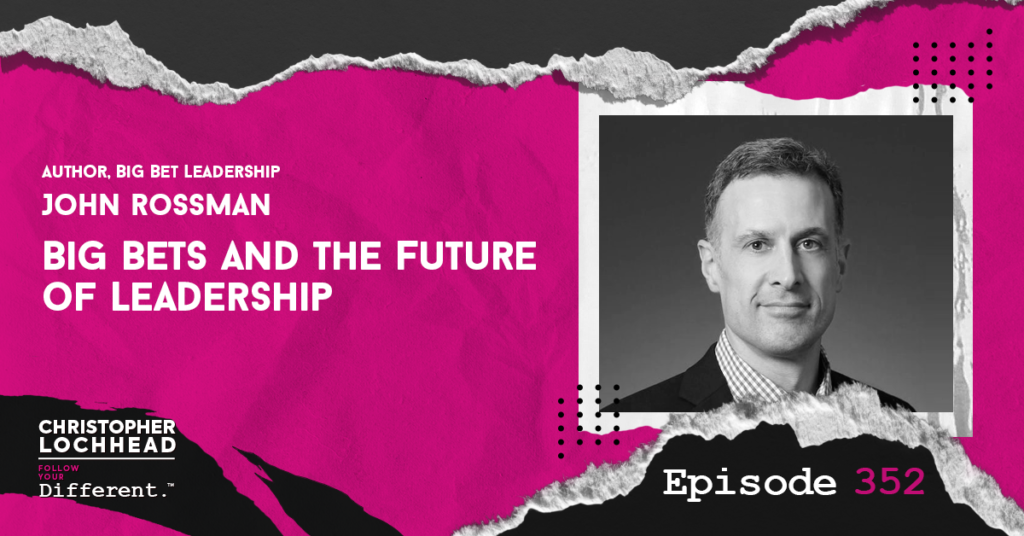
Podcast: Play in new window | Download (Duration: 1:24:53 — 58.3MB) | Embed
Subscribe: Apple Podcasts | Spotify | Pandora | RSS | More
On this episode of Christopher Lochhead: Follow Your Different, we are joined by our friend and multi-time guest, John Rossman.
John Rossman is a Master of Innovation and former Amazon Executive who brings to the table his insights from his new book, Big Bet Leadership: Your playbook for winning in the hyper digital era. His experiences with industry giants illuminate the path for making bold, transformative decisions.
This conversation is a deep dive into the courage and strategy required to lead in uncertain times, focusing on big bets that redefine industries, in an era where navigating technological change is crucial.
You’re listening to Christopher Lochhead: Follow Your Different. We are the real dialogue podcast for people with a different mind. So get your mind in a different place, and hey ho, let’s go.
John Rossman on Category Design and Big Bet Leadership
Christopher and John discuss the impact of category transformation and AI on businesses. John expresses gratitude for Christopher’s influential work on category design, which has shaped his thinking and client engagements positively.
They then delve into the challenges faced by companies in making big bets and succeeding in transformations, particularly in the context of AI and digital eras. Both acknowledge the historical struggle of major corporations to adapt and innovate compared to startups.
John emphasizes the need for senior leaders to rethink traditional approaches and embrace new strategies to navigate the hyper-digital era successfully and achieve substantial productivity gains.
John Rossman on Bold Moves vs Incremental Improvements
Christopher and John explore the necessity of both incremental improvements and bold moves in corporate leadership. They stress the importance of executives balancing ongoing operations with strategic innovation, emphasizing the need for a portfolio of big bets alongside incremental changes.
Drawing on insights from successful leaders like Satya Nadella, Jeff Bezos, and Elon Musk, they highlight the challenges of leading transformations in established companies. They propose a framework centered on creating clarity, maintaining velocity, and accelerating risk and value to guide organizations towards systematic transformation.
Customer Obsession and Customer-Driven Innovation
Christopher and John then talk about the importance of customer obsession and strategic thinking in driving successful business transformations. They critique competitor-focused strategies and highlight the significance of understanding customer problems deeply.
Drawing from Amazon’s approach, they emphasize the need for a portfolio of hypotheses and ideas, continuously testing and iterating before scaling.
Both caution against premature scaling and advocate for a patient approach that prioritizes operational readiness and sustainability. They stress that a combination of tactics, including customer obsession, agile methodologies, and strategic experimentation, is essential for systematic innovation and transformation.
To hear more from John Rossman and how to make Big Bets for your company, download and listen to this episode.
Bio
John Rossman
Digital and Innovation Advisor
Mr. Rossman is an expert at digital business models, operations and organizing programs. He has led engagements on developing innovation processes, Internet of Things strategies, marketplace and API driven platform business models.
He is a sought-after speaker on creating a culture of operational excellence and innovation.
Mr. Rossman has worked with clients across various industries, including retail, insurance, education, healthcare, consumer products, industrial products and transportation.
Mr. Rossman’s notable assignments include The Bill and Melinda Gates Foundation, Microsoft, Nordstrom and several of the world’s leading retail and insurance organizations.
Prior to Rossman Partners, John was a Managing Director at Alvarez and Marsal, a performance improvement consulting firm.
Prior to A&M, John was an executive at Amazon.com where he launched the Marketplace business and third-party selling platform, and ran the merchant services business.
Links
Connect with John Rossman!
LinkedIn: in/John-Rossman | Twitter: @JohnERossman | Get the book: Big Bet Leadership
We hope you enjoyed this episode of Christopher Lochhead: Follow Your Different™! Christopher loves hearing from his listeners. Feel free to email him, connect on Facebook, Twitter, Instagram, and subscribe on Apple Podcast / Spotify!
196 Marketing The Problem, Not Your Solution
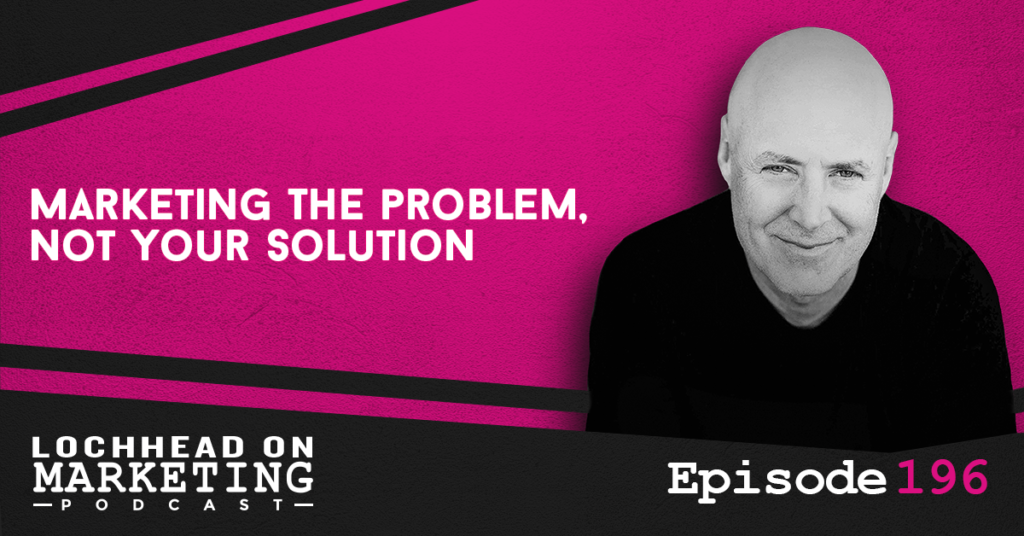
Podcast (lochheadonmarketing): Play in new window | Download (Duration: 18:09 — 12.5MB) | Embed
Subscribe: Apple Podcasts | Spotify | RSS | More
On this episode of Lochhead on Marketing, we talk about why marketing the user’s problem works, but marketing only your brand/product/solutions doesn’t.
Welcome to Lochhead on Marketing. The number one charting marketing podcast for marketers, category designers, and entrepreneurs with a different mind.
The Importance of Understanding Consumer Problems in Marketing
Market your brand/product/solution, and I think you want my money. Market my problem, and I think you want to help me. This is one of the biggest unlocks in category design for marketers. And it comes from a very simple, powerful notion: people do not buy solutions unless they have problems.
Yet a lot of companies do not get this simple concept. For them, it’s always brand awareness this, or advertise this product to the “market”. They play the attention game and call it frequency and reach. But most of the users in that market only see it as a cash grab for said company.
Marketing the Problem Done Right
So here we present a good example of how to market a user problem, and it’s in the form of the American jeans we all know and love.
Over the years, Jeans have come a long way from being those stiff dark blue pants to now being very soft and somewhat comfortable to wear. But therein lies the problem: the thing that makes it soft and pliable is very polluting and very resource-intensive. After which, they present their fix, a “remaking” of the American jeans as we know it.
Framing the Problem to Create Urgency
After naming the problem with the jeans, the article continues to explain that multiple companies have tried working together for years to develop jeans that are soft but not as punishing to the environment and our remaining resources. This serves as a way to intensify the problem by framing it as something that has not been solved. But now, they’ve found a solution. A solution to a problem they themselves proposed.
If you follow that flow, they first introduced a problem that a user can relate to, being that the jeans they wear harms the environment. They then mention that other companies have tried but not yet succeeded in finding a solution. Only after that do they supply the solution, so you can continue to enjoy those comfortable jeans without the previous repercussions and guilt on them. Prompting users to buy new jeans and ditching the old.
And that’s how you market with Category Design.
Link to the article on The Remaking of American Jeans
Don’t forget to grab a copy (or gift!) of one of our best-selling books:
Snow Leopard: How Legendary Writers Create A Category Of One
The Category Design Toolkit: Beyond Marketing: 15 Frameworks For Creating & Dominating Your Niche
A Marketer’s Guide To Category Design: How To Escape The “Better” Trap, Dam The Demand, And Launch A Lightning Strike Strategy
 The 22 Laws of Category Design: Name & Claim Your Niche, Share Your POV, And Move The World From Where It Is To Somewhere Different
The 22 Laws of Category Design: Name & Claim Your Niche, Share Your POV, And Move The World From Where It Is To Somewhere Different**NEW!** The B2B Tech Marketer’s Guide To Category Design: How To Engineer Your Market, Find What Makes You Different, And Become A Category Queen
We hope you enjoyed this episode of Lochhead on Marketing™! Christopher loves hearing from his listeners. Feel free to email him, connect on Facebook, Twitter, Instagram, and subscribe on iTunes!
351 The Harm of Childhood Trauma and the Hope of Resilience with Dr. Marc Hauser, Author of Vulnerable Minds
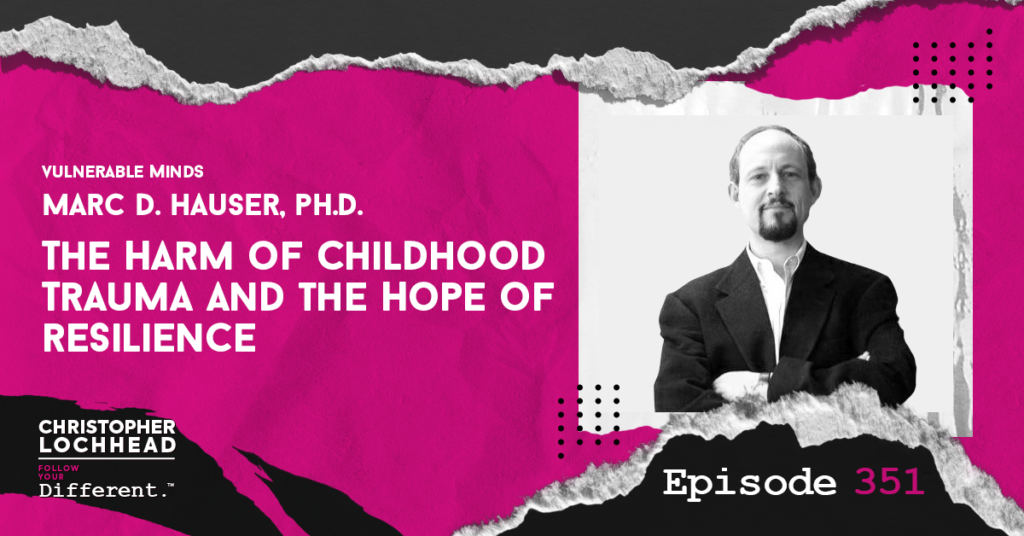
Podcast: Play in new window | Download (Duration: 1:10:00 — 48.1MB) | Embed
Subscribe: Apple Podcasts | Spotify | Pandora | RSS | More
On this episode of Christopher Lochhead: Follow Your Different, we are joined by educator, neuroscientist, and former Professor of Evolutionary Biology and Psychology at Harvard, Dr. Marc Hauser.
Dr. Marc Hauser has a new book out called Vulnerable Minds: The harm of childhood trauma in the hope of resilience.
You should also know this is a very adult conversation, as it deals with tough topics like childhood abuse. If you are not comfortable with such topics, you have been advised.
You’re listening to Christopher Lochhead: Follow Your Different. We are the real dialogue podcast for people with a different mind. So get your mind in a different place, and hey ho, let’s go.
Dr. Marc Hauser on Trauma and Compassion Fatigue in Working with Children
Dr. Marc Hauser, who works extensively with trauma victims, discusses the challenges of maintaining emotional well-being while dealing with the profound suffering of his clients. He acknowledges the risk of compassion fatigue and emphasizes the importance of self-care.
Dr. Hauser reveals his coping mechanisms, including physical activity and the supportive environment of his home life. He also highlights the necessity of balancing empathy for his clients with maintaining professional boundaries to avoid becoming overwhelmed.
Comparing his work to that of his veterinarian wife, he underscores the unique emotional demands of his profession, particularly when faced with physically aggressive clients. Despite the difficulties, Dr. Hauser emphasizes the importance of maintaining compassion and offering hope for a better tomorrow to those he serves.
Dr. Marc Hauser on Childhood Trauma and its Impact on Mental and Physical Health
Dr. Marc Hauser explains the significance of TRACEs (Trauma Response to Adverse Childhood Experiences) and RRACEs (Resilience Response to Adverse Childhood Experiences) alongside ACEs (Adverse Childhood Experiences). He elaborates on how ACEs, identified through a questionnaire developed by Dr. Vincent Felitti, are linked to physical and mental health issues.
Dr. Hauser highlights the transformative impact of understanding and addressing childhood trauma through TRACEs and RRACEs, emphasizing the importance of trauma-informed care and resilience-building strategies. It underscores the need for a holistic approach to supporting individuals affected by childhood trauma, considering both the adverse effects and potential pathways to resilience and healing.
Misconception on the ACE score
Dr. Hauser discusses the misconception surrounding ACE scores, emphasizing that they were never intended as individual predictors but as population measures. He explains how ACE scores were misinterpreted and integrated into policies like insurance coverage in California based on individual scores.
Christopher questions the implications of ACE scores on insurance premiums and treatment eligibility. Dr. Hauser clarifies that ACE scores are not accurate predictors of individual health risks but rather reflect population trends. He compares ACE scores to heritability measures, highlighting that they indicate predispositions but not definitive outcomes for individuals.
Dr. Hauser underscores the importance of understanding ACE scores as measures of experience rather than direct responses to adverse childhood experiences, introducing the concepts of TRACEs and RRACEs for a more nuanced understanding of trauma response.
To hear more from Dr. Marc Hauser on childhood trauma, download and listen to this episode.
Bio
Links
Connect with Dr. Marc Hauser
LinkedIn | Twitter / X | Marc D. Hauser website
We hope you enjoyed this episode of Christopher Lochhead: Follow Your Different™! Christopher loves hearing from his listeners. Feel free to email him, connect on Facebook, Twitter, Instagram, and subscribe on Apple Podcast / Spotify!
195 From Category Contenders to Category Kings with Al Ramadan
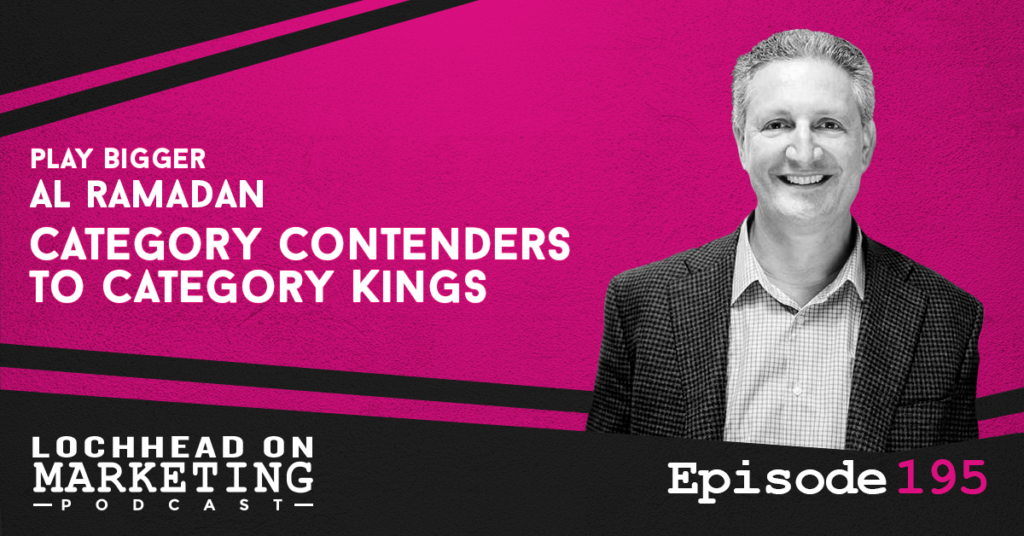
Podcast (lochheadonmarketing): Play in new window | Download (Duration: 1:31:17 — 62.7MB) | Embed
Subscribe: Apple Podcasts | Spotify | RSS | More
On this episode of Lochhead on Marketing, we enjoy the first of many visits from Al Ramadan in 2024, as we talk about moving from being a Category Contender to a Category King.
We’ll dig into what is a category contender in what it takes to win the 18-to-36-month epic category battle that every tech startup faces. So if you’re an entrepreneur or marketing leader who wants to go beyond competing to actually create and dominate your own market, you’re in the right place.
Welcome to Lochhead on Marketing. The number one charting marketing podcast for marketers, category designers, and entrepreneurs with a different mind.
Al Ramadan on Tech Industry Category Development and Dominance
Christopher and Al discuss the concept of being category contenders, reflecting on past research and their book on category kings.
They emphasize the dominance of one company, earning around 76% of the economics in every tech category, despite skepticism. They outline the three phases of category development: define, develop, and dominate, taking approximately 15 years.
They note outliers like open AI and Google’s swift battles, contrasting with Salesforce’s longstanding dominance. They highlight the importance of category design, likening it to a fast-paced battle where one company wins all, stressing its critical role in the tech industry’s landscape.
Market strategy in a competitive industry
Al and Christopher discuss marketing strategies in a competitive industry, emphasizing the importance of a winner’s mindset and setting the agenda.
They share a scenario where a leader in a crowded field differentiates by framing the problem uniquely, focusing on end-user needs rather than feature sets like competitors. Both highlight the futility of incremental strategies and the significance of capturing mindshare by empathizing with customer problems.
They term this the “Battle Royale” for mindshare, where winning means addressing the core problem effectively, rendering feature comparisons irrelevant. Christopher also stresses the pivotal role of understanding customer problems in securing market dominance.
Category design and understanding customer needs
Al and Christopher discuss category design and understanding customer needs. They highlight the importance of framing the problem uniquely to differentiate in a crowded market.
Christopher shares a scenario where a leader in a competitive field focuses on customer needs while competitors emphasize feature sets. They critique the common focus on technology rather than customer-centric solutions, illustrating with examples from Gartner’s history and Google Plus.
They emphasize that categories are about customers’ problems and opportunities, not just technology, stressing the significance of defining the problem scope to win in category battles.
To hear more from this Al Ramadan and Christopher Lochhead dialogue, download and listen to this episode.
Bio
Al Ramadan is a co-founding partner of Play Bigger Advisors and coauthor of the book, Play Bigger. He also co-founded Quokka Sports, which revolutionized the way people experience sport online.
Al then joined Macromedia and Adobe, where he spent almost ten years changing the way people think about great digital experiences. At Adobe, Al led teams that created the Rich Internet Applications category and helped develop the discipline of experience design.
In the early ‘90s he applied data science to Australia’s Americas Cup — an innovation in sports performance analytics. His work in sailing led directly to the idea for Quokka. He lives in Santa Cruz, California.
Links
Connect with Al Ramadan!
Play Bigger | LinkedIn | Category Contenders | The Science Behind Category Design
Don’t forget to grab a copy (or gift!) of one of our best-selling books:
Snow Leopard: How Legendary Writers Create A Category Of One
The Category Design Toolkit: Beyond Marketing: 15 Frameworks For Creating & Dominating Your Niche
A Marketer’s Guide To Category Design: How To Escape The “Better” Trap, Dam The Demand, And Launch A Lightning Strike Strategy
 The 22 Laws of Category Design: Name & Claim Your Niche, Share Your POV, And Move The World From Where It Is To Somewhere Different
The 22 Laws of Category Design: Name & Claim Your Niche, Share Your POV, And Move The World From Where It Is To Somewhere Different- 🏴☠️ **NEW!** The B2B Tech Marketer’s Guide To Category Design: How To Engineer Your Market, Find What Makes You Different, And Become A Category Queen
We hope you enjoyed this episode of Lochhead on Marketing™! Christopher loves hearing from his listeners. Feel free to email him, connect on Facebook, Twitter, Instagram, and subscribe on iTunes!
350 The AI Startup Teaching Kids To Build Tech Startups with Hannah Grady Williams and Ted Dintersmith of d’Skills
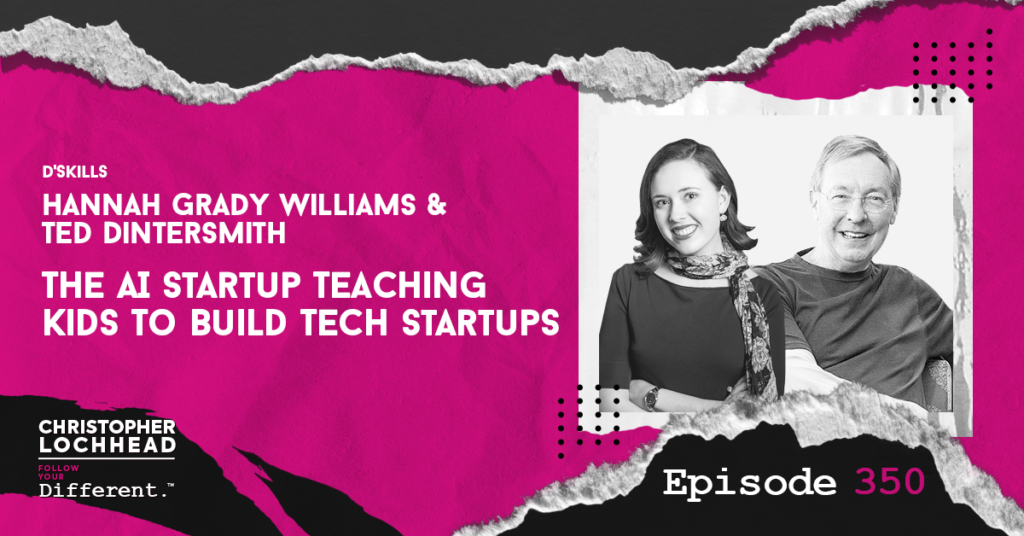
Podcast: Play in new window | Download (Duration: 1:09:56 — 48.0MB) | Embed
Subscribe: Apple Podcasts | Spotify | Pandora | RSS | More
On this episode of Christopher Lochhead: Follow Your Different, we bridge the gap between native analogs and native digitals in business by having a dialogue between the VC legend Ted Dintersmith and one of the new legends of her generation, Hannah Grady Williams.
Ted Dintersmith is a VC legend on the East Coast. He’s a former venture capitalist and a founding member of Charles River ventures, where he spent a significant portion of his career investing in and nurturing technology startups. Transitioning his focus toward education, he’s become an influential advocate for innovative educational practices.
Hannah Grady Williams is the legendary founder and CEO of d’Skills. She’s recognized for her innovative approach to shaping education and her efforts to equip the next generation with the tools necessary for success in the modern digital landscape. And, oh yeah, she’s only 25 years old.
Hannah, Ted and Chris discuss the challenges of bridging generational gaps in education as native digital and native analogs. Along with the importance of introducing AI into education to empower students with real world projects. You’ll be shocked at the transformative impact of the skills program on student’s confidence, problem solving abilities, and career prospects.
You’re listening to Christopher Lochhead: Follow Your Different. We are the real dialogue podcast for people with a different mind. So get your mind in a different place, and hey ho, let’s go.
Hannah Grady Williams on Education Reform and Preparing Students for the Workforce
After a quick introduction between the two guests, the conversation starts with Hannah recounting a pivotal moment from her childhood when her dad involved her in a real estate deal at age 12, sparking her interest in applying academic skills to real-world situations.
This experience led her to question the traditional education system’s effectiveness in preparing students for modern careers, especially in the age of AI. She and Christopher discuss the shortcomings of current education models, emphasizing the importance of practical skills over rote memorization.
Both share a vision of revolutionizing education by shifting focus from test scores to impact portfolios, where students showcase real-world projects demonstrating their skills. They aim to equip students with digital and AI skills through hands-on projects, enabling them to make tangible contributions to businesses. Ultimately, they envision a million students graduating high school with impact portfolios, ready for the demands of the modern workforce.
Ted Dintersmith on the Disconnect between Traditional School Education and Skill Development
Christopher and Ted discuss the stark difference between traditional education and teaching skills relevant to the modern workforce, particularly in the context of AI. They note the reluctance of many educational institutions to embrace AI tools, preferring to view them as potential cheating aids rather than productivity enhancers.
Ted highlights the disconnect between traditional schooling and the demands of the job market, where college graduates often lack marketable skills and face uncertain career prospects. He emphasizes the need for parents to recognize the evolving nature of jobs and the importance of equipping students with adaptable skills. They see initiatives like Hannah’s d’Skills as offering a path for students to create their own fulfilling careers, distinct from the outdated model of relying solely on degrees and conventional career paths.
Education Priorities and Student Motivation
Adding more on the topic of issues concerning traditional education, Ted also emphasizes that education’s central issue isn’t test scores or learning loss but rather the erosion of student motivation and purpose.
He highlights the success of programs like d’Skills in engaging students, enabling them to pursue meaningful projects they find important. These initiatives contrast starkly with traditional schooling, where students often lack enthusiasm and see little relevance in their coursework.
Ted underscores the importance of empowering students to engage in real-world projects that matter to them, a stark departure from the test-focused education system. Christopher contrasts the enthusiasm and results of students involved in programs like d’Skills with those in traditional education, noting the marked difference in attitude and approach.
To hear more from Hannah Grady Williams and Ted Dintersmith on the current state of education and how to improve upon it, download and listen to this episode.
Bio
Hannah Grady Williams is the founder/CEO of d’Skills. d’Skills is a one-of-a-kind digital training community that teaches young people entrepreneurship, AI skills and how to create a revenue producing business in 10 weeks.
Links
Connect with Hannah and d’Skills!
d’Skills | LinkedIn | Twitter/X
Connect with Ted Dintersmith!
Website | What School Could Be | LinkedIn
We hope you enjoyed this episode of Christopher Lochhead: Follow Your Different™! Christopher loves hearing from his listeners. Feel free to email him, connect on Facebook, Twitter, Instagram, and subscribe on Apple Podcast / Spotify!
194 How Important Is Framing, Naming, and Claiming A Problem? | Pirates Perspective
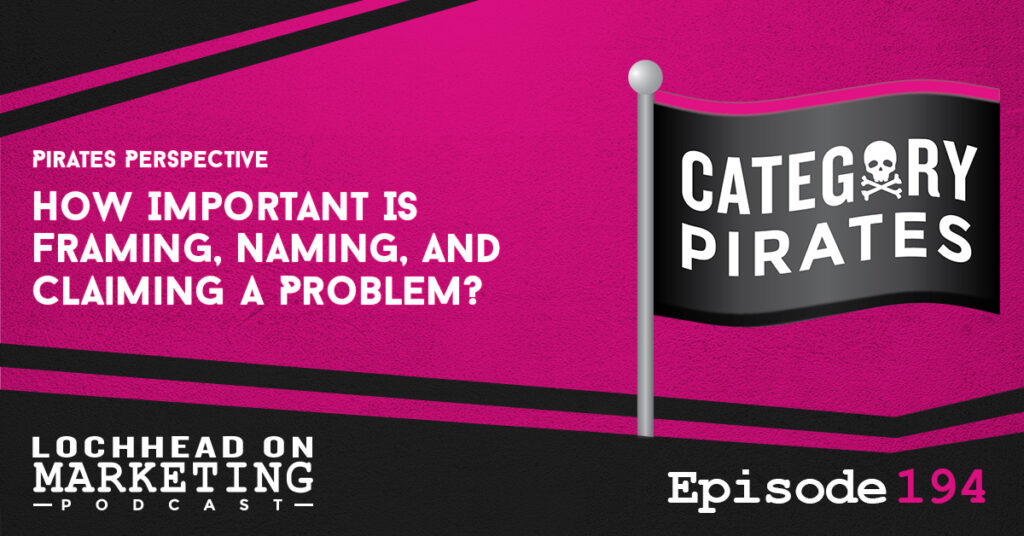
Podcast (lochheadonmarketing): Play in new window | Download (Duration: 11:43 — 8.0MB) | Embed
Subscribe: Apple Podcasts | Spotify | RSS | More
Today is a fun conversation with my fellow Pirates Eddie Yoon and Katrina Kirsch, as we talk about the importance of Framing, Naming and Claiming a problem, to create a different solution for your business.
From time to time, we drop these video discussions that three of us have in Category Pirates, and this one I thought you might also enjoy. If you do enjoy this kind of content, you can check us out at CategoryPirates.com And subscribe to the Category Pirates newsletter.
Welcome to Lochhead on Marketing. The number one charting marketing podcast for marketers, category designers, and entrepreneurs with a different mind.
The Importance of Naming, Framing, and Claiming in Business
When asked by Kristina on what “problem” does category design “Name, Frame, and Claim”, Christopher responds that category design solves the fundamental challenge of defining and owning a distinct market space. It asserts that successful companies excel in three areas: creating legendary business models, products/services, and categories. He emphasizes that a company must recognize category design as a crucial third of its success.
Eddie reinforces this, highlighting the importance of capturing a significant portion of the market share by framing, naming, and claiming a category. He argues that failing to do so results in competing for a smaller market share, which is familiar but less lucrative.
Ultimately, effective category design enables a company to articulate its unique value proposition clearly, ensuring it stands out to customers, investors, and employees.
The Value of being an “Exponential Different” in Business
The next part of the conversation delves into the concept of being an “exponential difference” in business, emphasizing the contrast between incremental improvements and exponential innovations.
Christopher reflects on his career, realizing that focusing on exponential changes often leads to friction within companies geared towards incremental progress. He highlights the importance of recognizing when to contribute to exponential shifts and when to step back, as pushing too hard on exponential change can disrupt the organization.
This understanding prompts a shift in perspective, reframing what was once seen as a career obstacle into a strategic advantage. Overall, it underscores the necessity of balancing incremental improvements with exponential innovations for sustainable growth and success in business.
If you want to join in the discussion, subscribe to Category Pirates and find more Pirates Perspective buried around the beach.
Don’t forget to grab a copy (or gift!) of one of our best-selling books:
Snow Leopard: How Legendary Writers Create A Category Of One
The Category Design Toolkit: Beyond Marketing: 15 Frameworks For Creating & Dominating Your Niche
A Marketer’s Guide To Category Design: How To Escape The “Better” Trap, Dam The Demand, And Launch A Lightning Strike Strategy
 The 22 Laws of Category Design: Name & Claim Your Niche, Share Your POV, And Move The World From Where It Is To Somewhere Different
The 22 Laws of Category Design: Name & Claim Your Niche, Share Your POV, And Move The World From Where It Is To Somewhere Different
We hope you enjoyed this episode of Lochhead on Marketing™! Christopher loves hearing from his listeners. Feel free to email him, connect on Facebook, Twitter, Instagram, and subscribe on iTunes!
349 October 7th Horror To Hope: A Tech Startup For Every Fallen Israeli with Izhar Shay & Ophir Shay, Next October Co-Founders
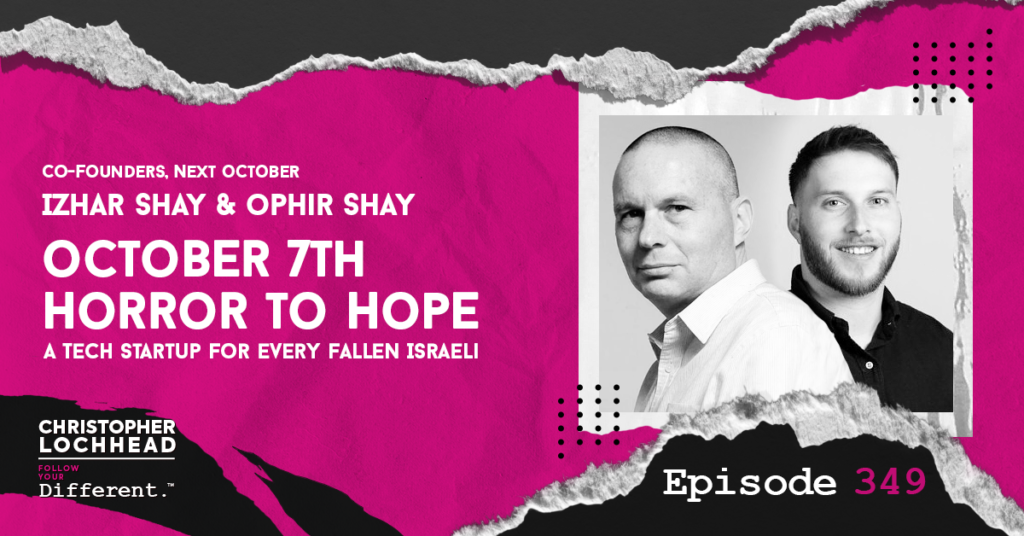
Podcast: Play in new window | Download (Duration: 1:29:04 — 61.2MB) | Embed
Subscribe: Apple Podcasts | Spotify | Pandora | RSS | More
On this episode of Christopher Lochhead: Follow Your Different, we are joined by Izhar and Ophir Shay, a father and brother to Israelis who have lost their lives in the Hamas attack. Today, they share how they chose to honor their fallen, in what can only be described as, Different.
Izhar Shay is an entrepreneur – a venture capitalist, very successful in the startup community and startup nation in Israel. And he’s a former Israeli Member of Parliament who served as the Minister of Science and Technology. His son, Ophir Shay, is also an entrepreneur, and he has a background in marketing and customer support. Both men have served honorably in the IDF.
In Israel, it is customary to plant a tree for fallen Israelis taken in war or terrorism. But Izhar and Ophir chose to honor them by starting a startup called Next October, a nonprofit on a mission to create and build a new successful Israeli startup for every person murdered or kidnapped on October 7. It’s an extraordinary vision. How you can take horror and turn it into hope and prosperity.
You’re listening to Christopher Lochhead: Follow Your Different. We are the real dialogue podcast for people with a different mind. So get your mind in a different place, and hey ho, let’s go.
Ophir Shay and Izhar Shay on Coping with Loss and Grief
When asked by Christopher on how they are doing, Ophir expresses optimism amidst difficulty, mentioning progress with connecting companies and families.
Izhar then reflects on the challenge of answering “how are you doing?” following a family tragedy on October 7, losing their youngest son, Yaron, a soldier. Christopher empathizes, sharing his experience of loss and the struggle with such questions.
Izhar details Yaron’s life, highlighting his values as both an Israeli and American citizen. Yaron is remembered as a remarkable individual, cherished by his family, and honored for his service.
Memories of Yaron and His Passions in Life
Izhar and Ophir continue the conversation about Yaron’s life, one that is filled with different passions, be it in music, watching and playing different sports, and tattoos.
Izhar further reflects on Yaron’s passion for sports, spanning across continents and connecting people. He highlights Yaron’s dedication to his favorite teams and how his commitment was recognized even in his funeral.
Christopher reciprocates, sharing his lifelong passion for sports, particularly football and hockey. He recounts a story about NBA Hall of Famer Bill Walton, emphasizing the joy of being an enthusiastic fan and celebrating one’s passions.
Both agree that sports serve as a unifying force, fostering connections and bonding within families and communities.
On accepting New and Old Communities
Continuing on that line of thought, Christopher shares his experiences of bonding with his nephews over football, and introducing them to different activities, and in effect, different communities. He notes that music and sports communities tend to be more accepting, as while options might differ vastly from person to person, it’s still an avenue to get a conversation started and to have something common to talk about even if it’s the first time you have met the other person.
Ophir agrees with this sentiment, and also adding that at the end of the day, it’s about embracing a new community, or even finally embracing one that you’ve been part of all along. Nothing is stopping anyone from being hardcore fans of their teams, as long as they show mutual respect for others and the teams they support. And isn’t that the point of it all in the end?
To hear more from Izhar Shay and Ophir Shay, and how their startups honor their fallen sons and brothers, download and listen to this episode.
Bio
Izhar Shay
Cofounder of Next October.
Former Minister of Science & Technology and MK.
High-Tech Entrepreneur, Venture Capital Investor, Director & Chairman.
Founder, Start-Up Stadium, the largest online community of Israeli entrepreneurs
A former columnist at “Globes”.
Founder of the “High-Tech Ba’Pkakim” podcast and radio show.
Ophir Shay
Cofounder of Next October.
Links
Connect with Izhar Shay and Ophir Shay!
Next October website | IsraelGives.org | Izhar’s Linkedin | Ophir’s LinkedIn
We hope you enjoyed this episode of Christopher Lochhead: Follow Your Different™! Christopher loves hearing from his listeners. Feel free to email him, connect on Facebook, Twitter, Instagram, and subscribe on Apple Podcast / Spotify!
193 Your Biggest Competition Is Thinking You Have Competition
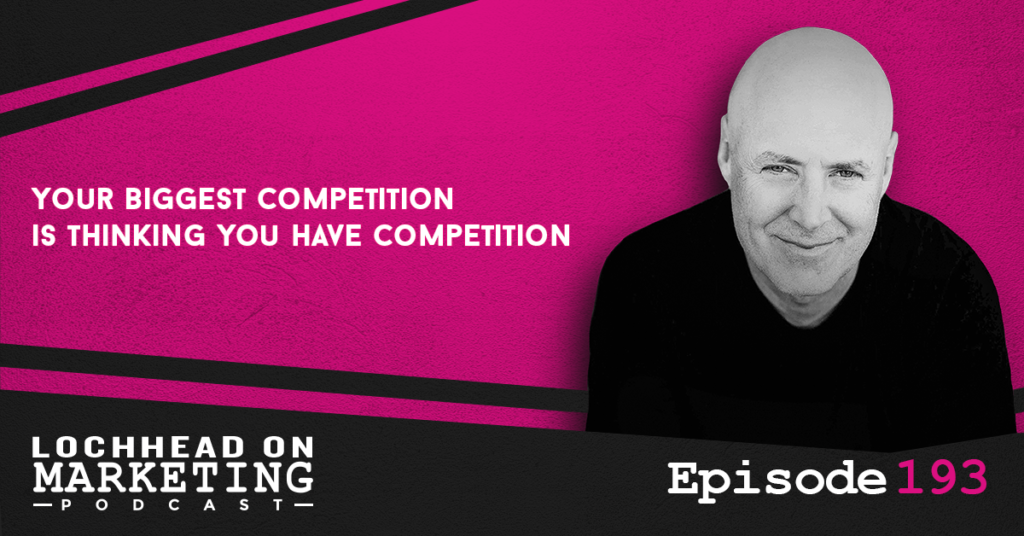
Podcast (lochheadonmarketing): Play in new window | Download (Duration: 15:53 — 10.9MB) | Embed
Subscribe: Apple Podcasts | Spotify | RSS | More
On this episode of Lochhead on Marketing, let’s talk about a trap that most budding Category Designers fall for, and that’s thinking about competition.
Welcome to Lochhead on Marketing. The number one charting marketing podcast for marketers, category designers, and entrepreneurs with a different mind.
Feature Battle vs Category Battle
Christopher shares a story of a company who consulted with him, regarding a rising competitor in the market. Most companies’ knee-jerk reaction would be to compete; take on the same messaging, and muscle out the competitor while it’s still early.
But in the end, they opted to do the opposite – they did not compete, at least not in the usual sense of it. Rather than doing a Feature Battle to see who has the better additions, messaging, and branding, they focused more on their product. They went the Category Battle route instead, carving out a large portion of the market with their improved category, and leaving the others battling for the remaining scraps.
Competition Derangement Syndrome
The apparent simplicity of the concept begs the question: why do most companies fail to adopt it? The answer lies in what could be termed “Competition Derangement Syndrome.” Many companies, instead of pioneering their own unique category to dominate, fall into a pattern of waiting for new categories to emerge before entering the fray.
Alternatively, larger corporations may opt to eliminate competition by acquiring the reigning Category King. However, this strategy essentially involves investing a significant sum to pave the way for the emergence of the next category, which their competitors will inevitably exploit. This cycle repeats itself, with each new category birthing fresh contenders, until the tables turn and the once-acquirer finds itself being acquired. Thus, the cycle perpetuates, underscoring the failure of many companies to break free from the pattern of reactive competition.
Competition vs Consumer
This does not mean that you avoid competing altogether. We are all driven by our will to fight, and business is not so different in that regard. But rather than going down to their level to fight on “equal” grounds, why not make it so that you are always thinking a few steps ahead, rather than slowing down just to match up to them.
And if they seem to be catching up to you at a faster rate, trying to adopt their strategies just means maintaining the status quo. It also sends the wrong message to the consumers, because you are adjusting for the competition, and not for them.
In the end, it’s better to achieve market dominance by consumer trust rather than just having the competitive edge, because there will always be someone that will try to compete. But as long as your consumers know that your product continues to improve for consumer satisfaction, then it will always remain as the Category King.
Bio
Don’t forget to grab a copy (or gift!) of one of our best-selling books:
Snow Leopard: How Legendary Writers Create A Category Of One
The Category Design Toolkit: Beyond Marketing: 15 Frameworks For Creating & Dominating Your Niche
A Marketer’s Guide To Category Design: How To Escape The “Better” Trap, Dam The Demand, And Launch A Lightning Strike Strategy
 The 22 Laws of Category Design: Name & Claim Your Niche, Share Your POV, And Move The World From Where It Is To Somewhere Different
The 22 Laws of Category Design: Name & Claim Your Niche, Share Your POV, And Move The World From Where It Is To Somewhere Different
We hope you enjoyed this episode of Lochhead on Marketing™! Christopher loves hearing from his listeners. Feel free to email him, connect on Facebook, Twitter, Instagram, and subscribe on iTunes!
348 How Young People Can Become AI Entrepreneurs In 10 Weeks with Hannah Grady Williams CEO of d’Skills
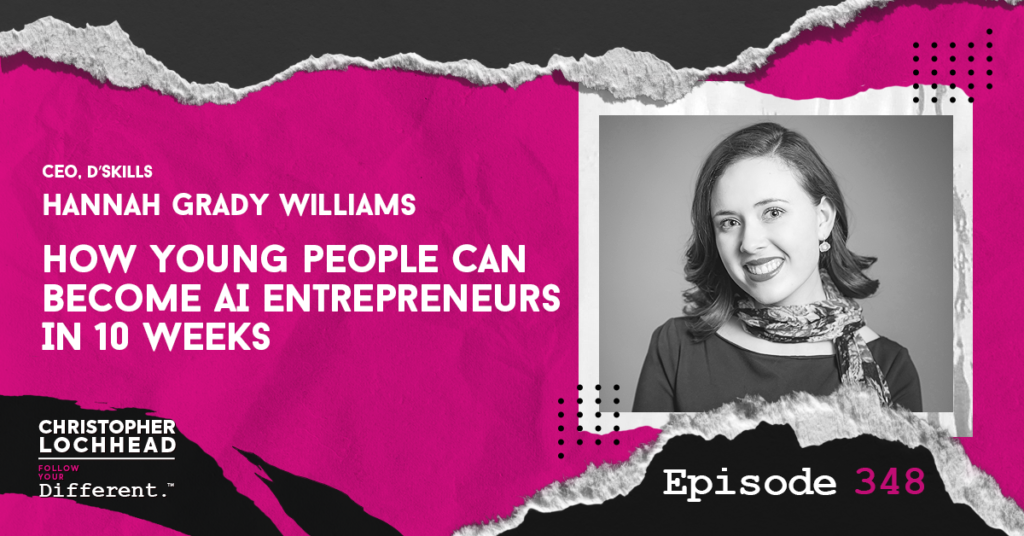
Podcast: Play in new window | Download (Duration: 51:35 — 35.4MB) | Embed
Subscribe: Apple Podcasts | Spotify | Pandora | RSS | More
On this episode of Christopher Lochhead: Follow Your Different, we unveil what’s really possible for young people when they’re set up to win as modern entrepreneurs, leveraging new AI technology. And who better to showcase it than the Gen Z whisperer for CEOs and executives, Hannah Grady Williams.
Hannah Grady Williams is back, and she’s here to talk about d’Skills. d’Skills is a one-of-a-kind digital training community that teaches young people entrepreneurship, AI skills, and how to create a revenue producing business in 10 weeks. And the superstars of this conversation are teenage AI entrepreneurs, Rory Straight and Anna Mitchell, two recent graduates of the d’Skills Program.
This episode will definitely challenge and inspire you to think about what’s possible for young people in new and different ways.
You’re listening to Christopher Lochhead: Follow Your Different. We are the real dialogue podcast for people with a different mind. So get your mind in a different place, and hey ho, let’s go.
Hannah Grady Williams on d’Skills and AI
The conversation starts off with Hannah introducing d’Skills and what they do.
Simply put, d’Skills is a hub where high schoolers are coming to learn 21st century skills and technology like ChatGPT and all its uses, and develop their skills further into projects that can make an impact in the market and the business world.
Hannah finds it fascinating how new technology can bridge the gap between young people’s ideas and the business world, and give birth to new products and categories that they can further develop as they learn more skills, or become more adept in their current ones.
Using AI for Business Projects while still in High School
Hannah also talks about a thing that she and d’Skills did over the summer called GPT Challengers Cup, in which they invited high schoolers from around the globe. And from this competition emerged Rory and Anna, who are also joining us on this episode.
It was astounding what ideas and end products that high schoolers were able to develop in the span of 30 days, but in the end, it was Rory & Anna’s project that emerged victorious.
What they ended up building was a Chrome extension that functions as an app that helps people study more efficiently by creating a comprehensive studying schedule based on the tasks you have registered in your to-do list.
Learning a New Skill in 15 Second or Less
Christopher then talks to Anna, who was handling the social media aspect of their team. This info was made more impressive by the simple fact that Anna has not handle social media marketing prior to the competition, and had to learn things through a bit of mentorship, but also doing a lot of research by herself.
“It’s actually funny that you asked that question because right now, I’m actually in a marketing class. And it’s super funny, because with all due respect to my teacher, I’ve learnt nothing in that class; It is like busy work, papers, everything. It’s crazy how much that I learned even like before the two weeks before the actual cup was over, and now that I’m doing it like in my free time, that it’s really not as hard to make it seem.
You don’t have to know all the business lingo and the economic terms. All you have to do is continue to push yourself and try new things and see what works and if it doesn’t work, then you know that doesn’t work and you move on from that.”
– Anna Mitchell
To hear more from Hannah, Rory, and Anna and the importance of skill-building with new technology in the business world, download and listen to this episode.
Bio
Hannah Grady Williams is the founder/CEO of d’Skills. d’Skills is a one-of-a-kind digital training community that teaches young people entrepreneurship, AI skills and how to create a revenue producing business in 10 weeks.
Aurora Straight
Hi, I’m Aurora, a STEAM enthusiast from Kansas with a deep passion for innovation and a strong presence in both academics and extracurricular activities. I compete in robotics and debate, channel my energy into basketball, and master precision in fencing. My ambition steers me towards aerospace engineering or a career in the Air Force, reflecting my desire to explore and innovate.
I co-founded ‘Acadium,’ a testament to my commitment to enhancing educational experiences through technology. My victory in the GPT Innovators Cup further underscores my ability to leverage AI for creative solutions. With internships at notable organizations under my belt, I’m honing my skills for real-world challenges.
My journey is more than just personal achievement; it’s about pushing the boundaries of what’s possible and inspiring others to do the same.
Anna Mitchell
Hello, I’m Anna, a high school student and digital art enthusiast turned innovator. My journey is marked by the creation of ‘Acadium,’ a Chrome extension that showcases my flair for digital solutions. Winning the GPT Innovators Cup was a milestone that affirmed my passion for AI-driven creativity. I’ve also contributed to our Community Cafe, enhancing our collective experience in the March sprint.
My hands-on approach to learning is evidenced by internships with leading organizations, including Peachtree Training Group, where I’ve applied my skills to real-world challenges. These experiences have not only honed my technical abilities but also fueled my ambition to innovate within the digital art and technology sphere.
Links
Connect with Hannah and d’Skills!
d’Skills | LinkedIn | Twitter/X
We hope you enjoyed this episode of Christopher Lochhead: Follow Your Different™! Christopher loves hearing from his listeners. Feel free to email him, connect on Facebook, Twitter, Instagram, and subscribe on Apple Podcast / Spotify!

